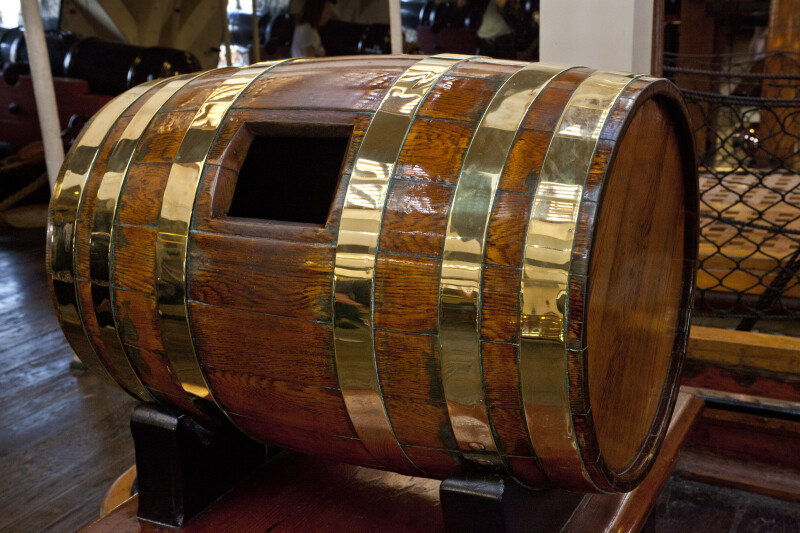

Fresh water was so precious that a guard was often posted by the scuttlebutt to ensure that water was only taken to drink and not, for example, to wash clothes with. So it became known as the scuttlebutt - the cask with a hatch in it.

To make it easier to scoop the water out with a tin pot or dipper, the head of the cask would be removed. It was usual to have a water cask on deck so that the crew had easy access to drinking water during the day. The verb to scuttle dates from the mid 17th century, at first in the sense of sinking a ship specifically by cutting holes in it - today we use it for doing so by any means. It’s of uncertain origin, but might be from the Old French escoutille, meaning a hatchway. That’s been around since the fifteenth century, when sailors called any smallish hatchway or opening in the deck a scuttle, especially if it was covered with a lid of some sort it was the usual term for an opening to let in light or air. The sense we want is the one of a hole cut in a ship’s timbers. Nor is it the one that means to move with short quick steps, perhaps like a spider that comes from an old English dialect word. It’s not the flattish open container, made of wickerwork at one time, whose name survives in coal scuttle that’s Old English, from Latin scutella for a dish or platter (its first sense in English). The first half appears in the language in several senses with different origins, so we have to be sure we’ve got the right one. The second half is easy enough - a butt is just the old word for a large cask. Compare water-cooler, figurative for 'workplace gossip' in mid-20c. The slang meaning 'rumor, gossip' is recorded by 1901, traditionally said to be from the sailors' custom of gathering around the scuttlebutt to gossip while at sea. (Rex Stout, Before Midnight)Īlso scuttle-butt, 1805, 'cask of drinking water kept on a ship's deck, having a hole (scuttle) cut in it for a cup or dipper,' from scuttle 'opening in a ship's deck' (see scuttle + butt 'barrel.' Earlier scuttle cask (1777). I gave Wolfe the scuttlebutt, but apparently he wasn't listening. ( Ceremony to mark ending of rum tot at HMS Victory, Yachting Monthly, July 2010) The rum was watered down in the Scuttlebutt and either drunk on the spot or collected in a rum fanny, or can, for the sailors’ mess.

(Rob Brooks, Artificial intimacy: where gossip, relationships and social media intersect, The Guardian, June 2021) Social scientists recognise that gossip transcends the limits of trivial scuttlebutt and fulfils important social functions. (Dominic Genetti Hearst, 5 hitting coach suggestions for the Cardinals, The Telegraph, November 2022)īut gossip often involves positive tones of awe, inspiration, pride and affection, as well as a great deal of emotionally neutral content. Can't take the heat, get out of the kitchen. (Chris Cameron, Inside the murder that scandalized NYC - and led to Truman Capote's downfall, New York Post, November 2022)Īnd the scuttlebutt is that Albert just couldn't take the public criticism - again you're a coach for the St Louis Cardinals, and you're under the microscope of a huge fan base. 1a a cask on shipboard to contain fresh water for a day's useī a drinking fountain on a ship or at a naval or marine installationįor 20 years, literary superstar and 'Breakfast at Tiffany’s' author Truman Capote slurped up the scuttlebutt like his vodka-heavy screwdrivers.


 0 kommentar(er)
0 kommentar(er)
